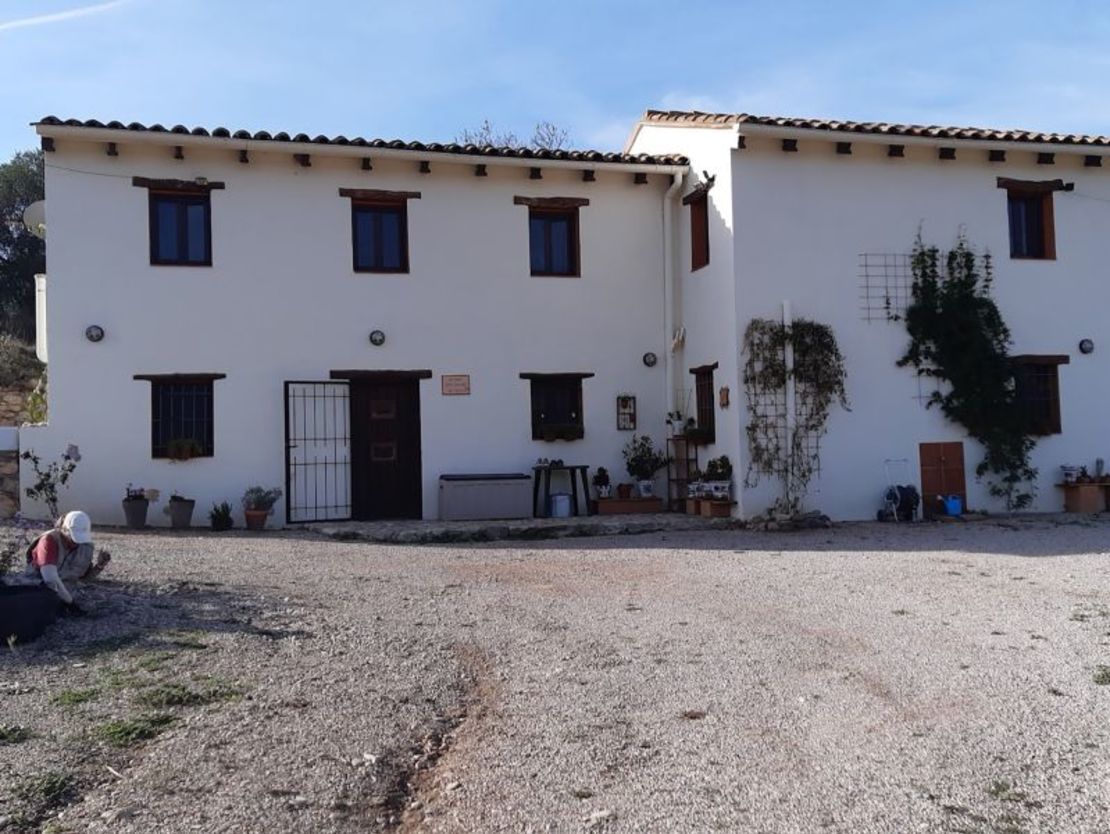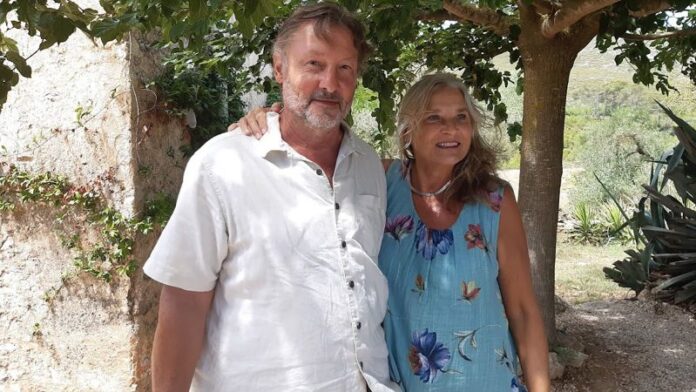(CNN) – For Regina and John Zdravich, the Italian dream began more than 20 years ago, after a friendship with a young Italian exchange student they were hosting made them think about the future.
The northwest Indiana couple had no way of knowing at the time that it would send them on an intercontinental odyssey that would encompass frustration, homelessness and ultimately happiness in an unexpected destination.
It was in 2001 that they formed a close bond with their young tenant, visiting her in Italy three times, during which they “fell in love” with the country and began to think about what life would be like if they moved there.
“Then we had another foreign exchange student from Germany,” John tells CNN Travel.
“And we started thinking, ‘Well, maybe we would do this, because we kept coming back to visit them in Europe.’”
As their retirement date approached, the couple, who have been married since 1988, began to take the idea more seriously.
“We had lived in the United States all our lives and wanted to try something different,” says Regina, who had several different jobs over the years but worked as an accountant before retiring.
They were also interested in downsizing their home.
“Our house was too big for us,” says Regina. “And we knew we would have to move somewhere. So we thought, ‘Let’s go abroad.'”
The Zdravichs, who retired at age 62, had gotten to know Italy well during their visits, so it was at the top of their list of destinations to move to.
After doing some research on the possibility, they decided to go for it and set out to sell their three-bedroom northwest Indiana home in 2017.
The couple packed some of their essential belongings into a box, shipped them to Italy and “started getting rid of everything we owned.”
“We started selling things online, everything we could sell,” Regina says. “We donate a lot to charity. It took us a long time to get rid of everything.”
According to John, they “did well” with the sale of their home and were “pretty comfortable financially” as they prepared to move.
The Zdravichs left the U.S. for Italy in January 2018, with their cat Sonya in tow. But things didn’t go exactly as planned.
They moved into an apartment in Salerno, near Naples, and began the process of applying for an elective residence visa, also known as an Italian retirement visa, a long-stay permit for non-EU citizens with a specified amount of passive income who intend to settle in Italy.
“We needed a national tax ID (a tax code similar to a Social Security number) and a rental contract for an apartment to prove we had a place to live,” says Regina.
After three months, the couple returned to the United States to complete the rest of the process through the Italian consulate in Detroit, hoping to return to the country permanently once they had all the documents in order.
Although they provided as much documentation as they could, the Zdravichs say they found the process “an absolute nightmare” and hit a major roadblock when they were asked to submit their income tax returns along with their retirement income.
“That wasn’t going to happen for another year,” Regina says, noting that she had retired at the end of 2017.
Realizing that they were unlikely to be approved without these details, the disheartened couple decided to withdraw their application and asked for their passports back.
“So we thought, ‘What the hell are we going to do?’” Regina adds.
At the time, the couple, who had been staying on Airbnb in Indiana and northern Wisconsin while they filed paperwork, didn’t really have anywhere to go.
“We didn’t have a house,” says Regina. “We didn’t have a house. No car. Nothing. And it was winter in northwest Indiana, which is snow, ice, all that kind of stuff.”
Not knowing what step to take next, they decided to return to Italy to try to sort things out.
While there, the Zdravichs searched online forums for advice or information from others who had been in similar situations and learned that some of those who had fought to obtain residency in Italy had chosen to retire in Spain.
“We thought, ‘Okay, we can do this,’” Regina says.
Since the couple had never been to Spain, they decided to travel to see if it was a place they could imagine themselves living.
“We had been to Italy several times and traveled to much of the country… But Spain had never been on our radar, beyond being able to point it on the map,” John admits.
While in the country, they took a chance and signed a one-year lease on an apartment so they would have a place to stay if all went well.
The Zdravichs then decided to return to the United States once again, renting an apartment in Chicago, while they put their affairs in order.
At this stage, John, whose father is from Serbia, a country in south-eastern Europe, began the process of obtaining Serbian citizenship, which would ultimately make moving to another European country much simpler if things went wrong again.
“We were located near the Serbian consulate and the Spanish consulate (in the US),” Regina says. “So we started the process with both of them.”
According to Regina, John obtained Serbian citizenship after about a month.
The couple obtained a non-lucrative visa (or retirement visa), a permit that allows non-EU citizens to live in the country without working or carrying out any professional activity, in Spain, within a period of approximately three months.
“It was a process like having a full-time job,” he adds.

In August 2018, about eight months after leaving the United States for Italy, the Zdravichs returned to Spain to start their new life.
The change in location created a lot of confusion for the couple during their first months in the country, especially when it came to language.
“It was a little disconcerting, because we had been studying Italian,” Regina says. “And literally overnight, we got rid of all our Italian books and Rosetta Stone and went out to find it in Spanish.”
Despite their disorientation, the couple threw themselves into life in Spain and settled in the coastal city of Oliva, located in the region of Valencia.
The Zdravichs soon discovered that they greatly enjoyed the Spanish lifestyle.
“Spanish people like to have fun,” John says, adding that he finds Spanish people “a little more relaxed.”
“This would be a great place to have been 40 years younger. They have their parties. We have fun.”
The couple, who had previously bought and renovated houses together, bought a three-bedroom house in the town of García in Catalonia, northeastern Spain, with two hectares of land for 165,000 euros (about US$184,000) in November 2018.
“We had horses when we lived in the United States and we knew we wanted to have them again,” Regina says.
“That’s why we were attracted to a place with land. And also, we are in a kind of natural area.
“For us and for what we wanted to do, it was the perfect environment, even though we were in Catalonia, which has its own language and wants to separate from Spain.”
Although the house “was in very good condition,” the Zdravichs spent about 10,000 euros (about $11,187) on renovation work and another 15,000 euros on a new solar energy system.
“We are actually on the Ebro River, which the Spanish may not think is so important,” says John.
“But in the United States, living on a major river is, even though I no longer fish, nice.”
One of the biggest difficulties they have encountered since moving has been learning the language, particularly now that they are in Catalonia, which has its own language, Catalan, as well as its own parliament and flag.
The autonomous region held a referendum for independence from Spain in 2017.
“Sometimes we get confused… They speak Catalan, especially in these small towns,” says Regina. “They want to preserve their Catalan language.
“And we need to know Spanish because all the official work we have to do is done in Spanish…
“The fact that a second language is spoken here has made our progress a little slower, I think.”
John points out that many of his friends at home are retirees from England, which hasn’t helped.
“We take language classes,” he says. “But since we don’t work, we speak English with each other (all the time).”
Another aspect of living in Spain that Regina finds difficult is the use of the metric system.
“I’m baffled,” she admits. “The recipes baffle me because I can’t understand them. “I’m finally getting used to the temperature.”

The couple, who now have a long-term resident card, have discovered that Spain is much more affordable than the United States, especially when it comes to eating out.
“Sometimes it’s almost like you can’t afford not to go out to dinner,” John says. “Because it is very affordable.
“And if you don’t like wine, you’re in the wrong place. Because the wine here is excellent and affordable.”
The Zdravichs are also full of praise for the country’s “incredible” public health system.
They say they purchased a private health insurance policy during their “early years” in Spain, but were later able to register for medical care after providing their residency documentation and medical history.
Catalonia has its own public health system, which any of its residents can access.
“John had to have back surgery, we didn’t pay a cent,” says Regina. “You go and buy a prescription, and you can use the change after the purchase.
“In the United States it is crazy how expensive healthcare is. And here it is not so much.”

